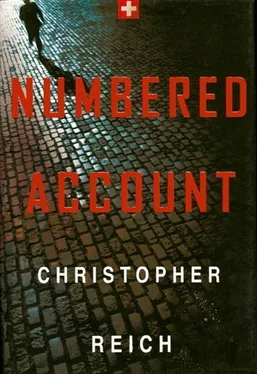Christ, he’s no older than I am, thinks Nick.
Enrile searches the yard. He yells again.
A rooster crows.
Enrile moves skittishly. He dances on his toes and lifts his head, as if straining to see a point one degree below the horizon. He looks behind him. Nervous. Getting ready to run.
Nick’s hand closes over the rifle stock. A bead of sweat trickles into his eyes. He tries to keep the crosshairs centered on the doomed guerrilla, but his hand is shaking.
Enrile shields his eyes and looks directly at him.
Nick holds his breath. Slowly, he squeezes the trigger. Arturo de la Cruz Enrile spins. A cloud of pink vapor erupts from his head. Nick feels the rifle kick and there’s a loud crack, like a small firecracker, a Black Cat. He was aiming for the heart.
Enrile is down. He is motionless.
The marines lie and wait. The sharp report of the rifle drifts into the air, as fleeting as the morning steam rising from the paddies.
Ortiga scans the clearing and is up, running to confirm the kill. He removes his K-Bar, raises it high into the air, and brings it down into Enrile’s chest.
* * *
Abruptly, Nick spun on his heels and buried his face in the shoulder of his overcoat. He squeezed his eyelids and prayed for the machine to stop projecting his relentless nightmare. Momentarily, he was aware of the freezing night air. The snow that had fallen on Zurich for the better part of the day had begun to taper off. The wind had died down.
He had taken a young man’s life on that morning. A true believer, like himself. For one minute only, he had believed that his actions had been correct; that his responsibility as commander of the insertion team dictated that he take the shot in place of Burke; that his job was not to question the directives of his government, but to faithfully execute them.
For one minute only.
Nick stood in the men’s room of Emilio’s Ristorante, his sweaty hands clutching the sink, and stared into the mirror. His eyes were open wide, unnaturally so. His hair was dripping wet. The walk from the lake had done little to calm him. He was still jittery, his system jerky with adrenaline. He shut his eyes and strengthened his grip on the sink. It’s done, he told himself. You can’t change the past.
Nick turned on the water and splashed several handfuls in his face. He grabbed a paper towel and dried off his hair, then leaned over the sink, placing his ear next to the running tap, listening to the water fall onto the polished porcelain. He didn’t know how long he stayed in that position, maybe five seconds, maybe a minute, maybe longer, but after a certain time his breath came normally and his heartbeat slowed. He lifted his head and looked in the mirror. Better now, but hardly perfect. Remnants of coarse paper stuck out here and there, contrasting sharply with his disheveled black hair. He plucked the flakes free, one by one. “Good evening, Dr. Schon,” he rehearsed saying. “Don’t mind me. Just a mild case of dandruff. Happens all the time.” And seeing himself like that, hair mussed, fingers searching for the damp morsels of paper, mouth much too anxious, he managed a laugh, and slowly the tension began to slip away.
* * *
“Am I late?” Sylvia Schon inquired, checking her wristwatch incredulously.
“Not at all,” said Nick, standing and shaking her hand. “I got here a little early. I had to get out of the snow.”
“You’re sure? We did say seven, didn’t we?”
“Yes. Seven.” He felt calmer now, no small thanks to the double vodka he had finished in several hurried gulps. “By the way, thanks for the invitation.”
Dr. Schon looked surprised. “Manners too? I see the Chairman has brought us a gentleman and a scholar.” She slid into the booth next to him, and eyeing the empty highball glass said to the hovering captain, “I’ll have the same as Mr. Neumann.”
“Ein doppel vodka, Madame?”
“Yes, and one more for my colleague.” Then to Nick: “It is after hours, isn’t it? One thing I love about you Americans is that you know how to enjoy a decent drink.”
“Some opinion you must have about us. A nation of noncommittal drunks.”
“A little shy of commitment, yes. Drunks, no.” She turned her attention to the stiff napkins arranged on the table. She unfolded one and placed it in her lap.
Nick turned his attention to Sylvia Schon. Her blond hair fell in a shower onto the shoulders of a maroon blazer, which he guessed to be cashmere. A chiffon blouse was prudishly buttoned just shy of the neck, revealing a strand of pearls. Her hands were a creamy white, unblemished by sun or age; fingers, long and graceful, absent of jewelry.
Since his arrival at the bank six weeks earlier, he had yet to view her in anything but a professional light. In their meetings, she had conducted herself formally. She was instructive. She was attentive. She was even friendly—to a point. But she was always careful to maintain a certain distance. She laughed as if each chuckle was rationed, and she was allowed only one or two an hour.
Now, watching her relax, sensing her shed her shell of harried importance, Nick realized he’d been anxious to see another side of her. Sprecher’s words had never really left his mind. She’s got something else in mind for you. He still wasn’t sure how to interpret them—as a sincere warning or a sophomoric aside.
A mustachioed waiter brought their cocktails and proffered menus. Sylvia Schon waved the menus away. “There is only one thing to eat at Emilio’s and it is the chicken. A small Mistkratzerli roasted with herbs and absolutely doused in butter. It is heavenly.”
“Sounds great,” said Nick. He was very hungry.
She fired off their order in rapid Spanish. Dos pollos, dos ensaladas, vino de rioja, y dos agua minerales. Afterward, she turned toward him and said, “I view every member of the finance department as a personal responsibility. It’s my job to make sure you are happy in your position, and by that I mean that you have the opportunity to grow as a professional. Your career is my concern. We pride ourselves on attracting the best talent and on keeping them.”
“For at least fourteen months,” he butted in.
“At least,” she agreed, grinning. “You may have heard my displeasure at some of the American graduates Dr. Ott has brought over in the past, but don’t take it personally. My bark is worse than my bite.”
“I’ll be sure to keep that in mind,” said Nick. He was taken aback by her solicitous nature. It was a new color for her and he liked it.
Emilio’s was jumping. A stream of waiters in crisp white jackets plied back and forth from kitchen to table. Patrons crowded the banquettes that lined the garish red walls and spoke loudly, effusively to one another. Meals were devoured with relish and abandon, cigarettes smoked with hearty appreciation.
“I had a chance to glance through your papers,” said Dr. Schon after she had taken a generous sip of vodka. “You’ve led an interesting life. Growing up in California, visits to Switzerland. What made you join the marines? They’re a tough bunch, aren’t they?”
Nick shrugged. “It was a way to pay for college. I had a track scholarship for two years, but when I didn’t have quite the spring in my step the coaches expected, I lost it. No way I was going back to waiting tables. I’d had enough of that in high school. The marines seemed like the right idea at the time.”
“And your work here? It must seem rather dull to work in a Swiss bank when compared with flying in helicopters and playing with guns.”
Dull? Nick asked himself. Today I shielded the assets of a suspect wanted by the international authorities. I was followed through the streets by a guy dressed like Sherlock Holmes, and I was threatened by a rabid drug enforcement agent. Where else can you sign up for those kind of thrills?
Читать дальше












